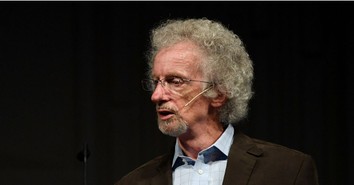4 Crucial Tests to Evaluate What People Are Teaching You

There are a lot of teachers out there.
From multi-site megachurch pastors, to smooth-talking prophets of small congregations, to the over-the-top online-only preacher. The availability of voices that seek to guide our spiritual development is vast. It's daunting and, frankly, disorienting to not only choose who to listen to, but to discern what we're hearing through these teachers and preachers.
The question inevitably arises: How do we, as faithful followers of Jesus discern the genuine from the counterfeit in the teachings of preachers, prophets, and teachers?
But maybe a more pressing question is: If we discover our favorite pastor, preacher, teacher, or prophet isn't aligned with the Gospel and pointing us to the Jesus found in scripture, are we willing to find someone else's authority to sit under?
As a Pastor and teacher myself at www.lifepointnv.com, I've distilled at least five key criteria (there are many more) for evaluating the sermons and doctrines that come your way. Whatever Pastor, preacher, or claimed-to-be-prophet you're listening to, I hope these criteria at least will help you discern whether they're helping you become more like Christ. These benchmark tests are not a wholesale rejection of charismatic preaching or innovative biblical interpretation. Instead, they form a safeguard against teachings that, intentionally or not, lead us astray from the true heart of the Christian faith.
The Apostle Peter warned us of how false teachers will infiltrate the church, leading many astray:
There were indeed false prophets among the people, just as there will be false teachers among you. They will bring in destructive heresies, even denying the Master who bought them, and will bring swift destruction on themselves.
Many will follow their depraved ways, and the way of truth will be maligned because of them. They will exploit you in their greed with made-up stories. Their condemnation, pronounced long ago, is not idle, and their destruction does not sleep. - 1 Peter 2:1-3
Photo Credit: © Getty Images/BrianAJackson
1. Consistency with Biblical Teaching

1. Consistency with Biblical Teaching
SLIDE 1 OF 5
The bedrock of good teaching comes from the Word itself. If a speaker engages in cherry-picking verses to validate their point or, worse, crafts a narrative that is at odds with the central message of the scriptures, it's a red flag. Not every teacher will be right on everything in every sermon or message. We will get things wrong, but we must not be wrong consistently in our presentation or handling of scripture. The Bible is not a buffet where we choose what suits our tastes. It is a comprehensive story that unfolds over many centuries and reflects a God who is unchanging in His character and purposes. Any teaching that deviates from this core truth should be carefully evaluated and, if necessary, discarded.
When teachers shy away from the darker, complex, uncomfortable, or more challenging verses or passages that require the necessary struggle of interpretation and insight, it's likely they're more interested in comfort than Truth. Faith rooted in a selective reading of scripture is brittle and easily shattered by the challenges of life. Insist on listening to teachings that engage with the whole Bible, even and especially the parts that unsettle us.
What to watch out for in a teacher: Listen closely to teachers who use only a sentence or two or focus on just one word in order to make a point. Be wary of teachers relying more on anecdotal stories than analysis of scripture. Take note of teachers who cannot tie large portions of scripture, stories, books, or major events together to reflect the narrative of the Bible.
What to look for in a good teacher: Look for teachers who have at least some Biblical training through seminary or Bible college or are continually growing in their knowledge of scripture, history, theology, people, and especially Jesus. Look for teachers who quote and reference other theologians or academics in making their points. Seek out teachers who don't shy away from challenging scriptures, who can honestly say "I don't know" at times, and who teach from a posture of humility.
Photo Credit: © Getty Images/SeventyFour
2. Emphasis on External Benefits over Internal Transformation

2. Emphasis on External Benefits over Internal Transformation
SLIDE 2 OF 5
A focus on external benefits—such as wealth, health, and worldly success—over the internal transformation that the Gospel of Christ seeks to work within us poses a significant danger. It mirrors the temptation Jesus faced in the wilderness, where the devil enticed Him with worldly kingdoms and their glory (Luke 4:5-8). True discipleship concentrates on inward change and character development in the likeness of Christ rather than the accumulation of external rewards.
External benefits such as success, rewards, living a good life, or good health are not bad things in and of themselves, but they should not take prominence over internal transformation. When we celebrate Christ making us into a new creation (2 Corinthians 5:17), we take this new self with us everywhere we go. Internal transformation through Christ's saving grace and by the power of the Holy Spirit to make us holy gives us a life no external benefit could ever match.
What to watch out for in a teacher: Be wary of messages that emphasize only external benefits or use external promises as a means to attract more followers. Look out for teachers who are quick to dismiss struggles and challenges in our Christian walk, instead emphasizing the outward fruits of success. Be especially wary of too much talk about
What to look for in a good teacher: Seek out teachers who speak about internal transformation through Christ's saving grace and the work of the Holy Spirit. Look for teachers who emphasize character development and spiritual growth over external rewards. Discerning teachers will acknowledge that following Christ involves struggles and challenges but ultimately leads to true transformation from the inside out.
Photo Credit: ©Getty Images/Josearba
3. You-Centered Messages

3. You-Centered Messages
SLIDE 3 OF 5
It's common for messages to be tailored to the audience, but when a preacher consistently points the narrative lens toward the individual rather than God, there is cause for concern. We are not the protagonists of the gospel; God is. If anything, before we receive Christ through faith, we are the antagonists, the enemies of God without Christ (Romans 5:10). When teachings consistently cast God in a role of fulfilling personal wishes rather than as the ultimate goal of our worship, the danger is that we become consumers of faith rather than its grateful bearers.
A good sermon or teaching should remind us of our smallness and our complete dependency on God. It should be both humbling and empowering, yet always with the focus first and foremost on the compelling power of God's grace. True followers such as Jesus' disciples, Paul, and the later missionaries to the ends of the Earth downplayed their role and magnified God's glory. Messages that invert this hierarchy subtly corrode our spiritual posture, turning our faces inward when they should be uplifting.
What to watch out for in a teacher: Be cautious of teachers whose sermons are saturated with affirmations that prioritize personal success, satisfaction, or happiness over a deeper relationship with God. Notice if the teachings often reinterpret biblical narratives to center around contemporary life issues without pointing back to divine wisdom. Steer clear from leaders who treat prayer and faith as mere tools for achieving earthly desires, subtly placing the believer's wants above God's will. Such teachings can mislead, cultivating a self-centric rather than Christ-centric faith.
What to look for in a good teacher: Seek teachers who spotlight the sovereignty and majesty of God above all. Look for messages that challenge believers to examine their lives through the lens of scripture and God's character, not their personal ambitions or desires. A good teacher will always guide the congregation back to the essence of worship and service, emphasizing our role as followers and servants of Christ. They inspire a faith that yearns for God's presence and kingdom rather than pushing a narrative that God exists to serve our ends.
Photo Credit: ©iStock/Getty Images Plus/ideabug
4. Use of Emotional Manipulation

4. Use of Emotional Manipulation
SLIDE 4 OF 5
I believe God gave us emotions to respond to truth in a meaningful way. The problem is, emotions are powerful. So powerful, in fact, that they can overpower our desire to hear, learn, and live by the truth. When a speaker consistently plays on our fears or our hopes and manipulates our emotions to draw us into an experience that bypasses our reason, it's a betrayal of our capacity for true faith.
While emotions can be a beautiful aspect of our spiritual experience, they should always be grounded in biblical truth. When a speaker relies on emotional manipulation to drive their message, they open the door for deception and false teachings. Jesus often spoke with passion and emotion, but it was always backed by sound teaching and truth (Matthew 7:28-29). As followers of Christ, we must be sober-minded and discerning when it comes to our emotions in matters of faith.
What to watch out for in a teacher: Be wary of overly theatrical or emotionally charged presentations that seem to focus more on eliciting a reaction than imparting biblical truths. Be cautious of teachers who use personal stories or testimonies to manipulate and sway emotions or to inject a promise or principle into scripture that just isn't there. Be cautious of leaders who consistently focus on the positive and neglect to address difficult or uncomfortable truths in scripture.
What to look for in a good teacher: Look for teachers who prioritize sound biblical teaching above emotional manipulation. Good teachers will use personal stories and illustrations to enhance the understanding of biblical truths rather than the other way around. A good teacher will create an environment that allows the Holy Spirit to work through the Word without relying on manipulating emotions. Seek out teachers who speak with conviction and passion but who are always grounded in biblical truth. Look for messages that challenge and convict rather than simply seeking to make people feel good.
Photo Credit: ©GettyImages/Rawpixel
Final Thoughts

Final Thoughts
SLIDE 5 OF 5
These evaluative tools are not meant to create a culture of skepticism or to discourage exploration and debate within the faith community, especially around public teaching and preaching. Quite the contrary, they are just a few tools for cultivating a discerning heart and mind, for upholding the integrity of the gospel message. As believers, it is our responsibility to test everything against the unchanging truth of God's Word (1 Thessalonians 5:21). Just as we are called to test the spirits, we must also test the teachings that spiritual leaders bring to us.
In the end, maybe these questions are the simplest tools we should use as we listen to teachers: Is this teacher introducing me to who Jesus truly is? Are they convicting me to become a better disciple of Jesus? Are they making God the central character and purpose of the message rather than me?
If the answer is yes, the teaching likely bears the stamp of authenticity. If, on the other hand, the message leads us to a faith that is self-serving, shallow, exclusionary, or worst of all – to be more "us-like" than "Christ-like," the teacher and their teachings must be abandoned. By critically assessing what is taught to us, we engage with scripture and with each other, fostering a faith that is not a house built on sand, but one that can endure the tempests of life as we seek to reflect God's glory on Earth.
Photo Credit: ©Getty Images/Brian A. Jackson
Kile Baker is a former Atheist who didn’t plan on becoming a Christian, let alone a Pastor, who now writes to try and make Christianity simple. Kile recently wrote a study guide to help people “look forward to and long for Heaven.” You can get one on Amazon here. He also writes at www.paperbacktheologian.com. Kile is the grateful husband to the incredibly talented Rachel, Dad to the energetic London and feisty Emma and Co-Lead Pastor at LifePoint Church in Northern Nevada. He single handedly keeps local coffee shops in business.
Originally published March 28, 2024.









